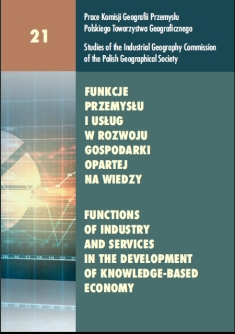Determinants of the Knowledge-Based Services Development, on the Basis of the Analysis of Dental Business in Poland
DOI:
https://doi.org/10.24917/20801653.21.21Keywords:
business based on knowledge, Poland, dental business, dentistsAbstract
In the article the authors analyzed the determinants of dental services’ development inPoland, as an example of knowledge-based services. For this purpose, they conducted tests and analyses,whose results are presented in the article. They proved “knowledge base” of dental professionby means of the analysis of dentists’ financial and time investment. They presented the results of theirsurvey conducted on a group of 60 dentists, preceded by an interview with the owners of dental surgeries.They examined the situation of dentists in the labor market in comparison to other examples of“knowledge-based professions,” which showed that the unemployment does not affect this profession.It cannot be said about other knowledge-based professions. The analysis of training offers for peoplewho want to start their own business provided some information about the scope of technical assistancein setting up and running their own business which can be obtained from PARP, NIL and private training companies. The authors carried out an analysis of the costs of starting dental practice. As a result ofresearch and interviews, the authors were able to identify the factors which determine the functioningof dental services market in Poland. It turned out that the main barriers to the development of theseservices is surprisingly: the lack of knowledge about setting up a business, and in the second place, thelack of funds to start it.Downloads
Metrics
References
Borowiec, M. (2006). Etyczne aspekty globalizacji w procesie kształtowania przedsiębiorczości. Przedsiębiorczość – Edukacja, 2, 185–192.
Borowiec, M., Dorocki, S., Jenner, B. (2009). Wpływ zasobów kapitału ludzkiego na kształtowa¬nie społeczeństwa informacyjnego i innowacyjności struktur przemysłowych. Prace Komisji Geografii Przemysłu Polskiego Towarzystwa Geograficznego, 13, 95–109.
Dorocki, S., Jenner, B. (2009). Wpływ wielkości nakładów inwestycyjnych w sektorze B+R na regio¬nalne zróżnicowanie tempa rozwoju Francji. Przedsiębiorczość – Edukacja, 5, 188–197.
Dorocki, S., Kilar, W., Rachwał, T. (2011). Założenia i cele Projektu „Krok w przedsiębiorczość” dla nauczycieli szkół ponadgimnazjalnych. Przedsiębiorczość – Edukacja, 7, 308–320.
Dziennik Gazeta Prawna, 2011-02-16.
Dziennik Gazeta Prawna, 2011-02-20.
Gazeta Wyborcza, 2012-02-27.
OECD 1996. . Paris, GD 102.
Raport Instytutu Filozofii i Socjologii PAN i Ośrodka Studiów, Analiz i Informacji NIL: Możliwości i bariery rozwoju zawodowego lekarzy i lekarzy dentystów. Warszawa 2012.
Raport MPiPS, Departament Rynku Pracy: Zarejestrowani bezrobotni oraz wolne miejsca pracy i miejsca aktywizacji zawodowej wg zawodów i specjalności w II półroczu 2011 roku. Warszawa 2012
Rogut, W. (2011). Dentyści ruszają po wiedzę. Służba Zdrowia, 85–92 (4086–4093).
Strona Internetowa Naczelnej Izby Lekarskiej: http://www.nil.org.pl/.
Wach, K. (2010). Ewolucja europejskiej polityki wspierania przedsiębiorczości w latach 1973–2013. Prace Naukowe Uniwersytetu Ekonomicznego we Wrocławiu, seria Ekonomia, 113, 1003–1019.
Żądło, J. (2009). Leasing jako źródło kapitału inwestycji. Niepublikowana praca dyplomowa pod kierunkiem naukowym dr D. Podedwornej-Tarnowskiej. Warszawa: Szkoła Główna Handlowa w Warszawie.
Downloads
Published
How to Cite
Issue
Section
License
Articles are published under the terms of the Creative Commons License (CC BY-ND 4.0; Attribution– NoDerivs).

